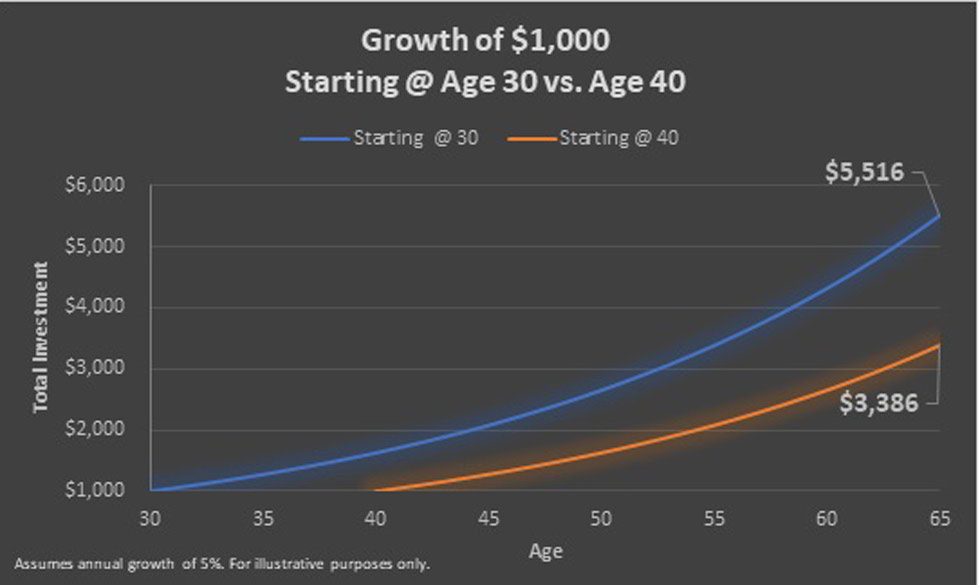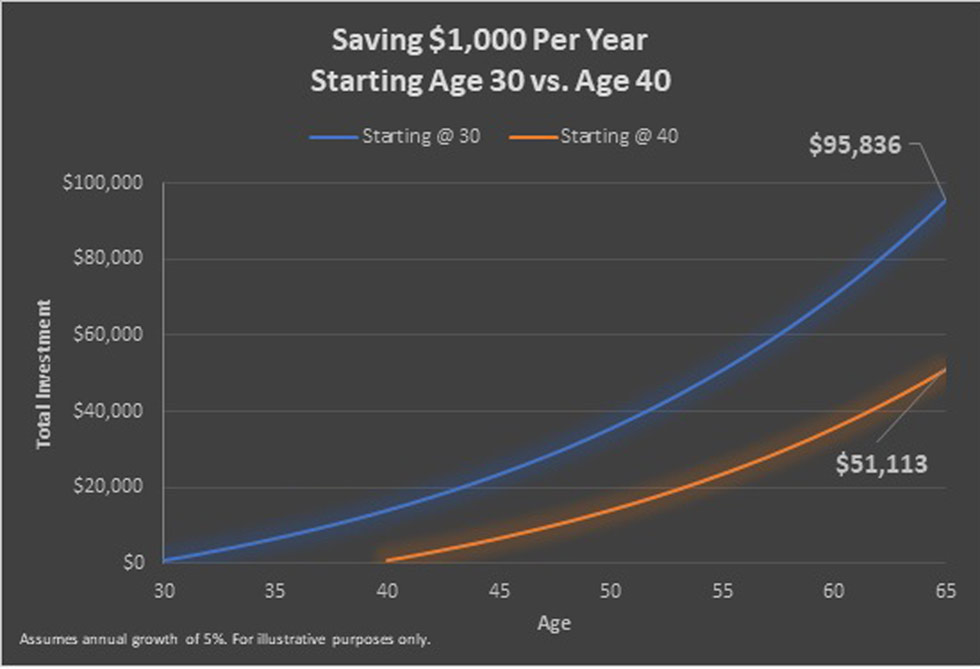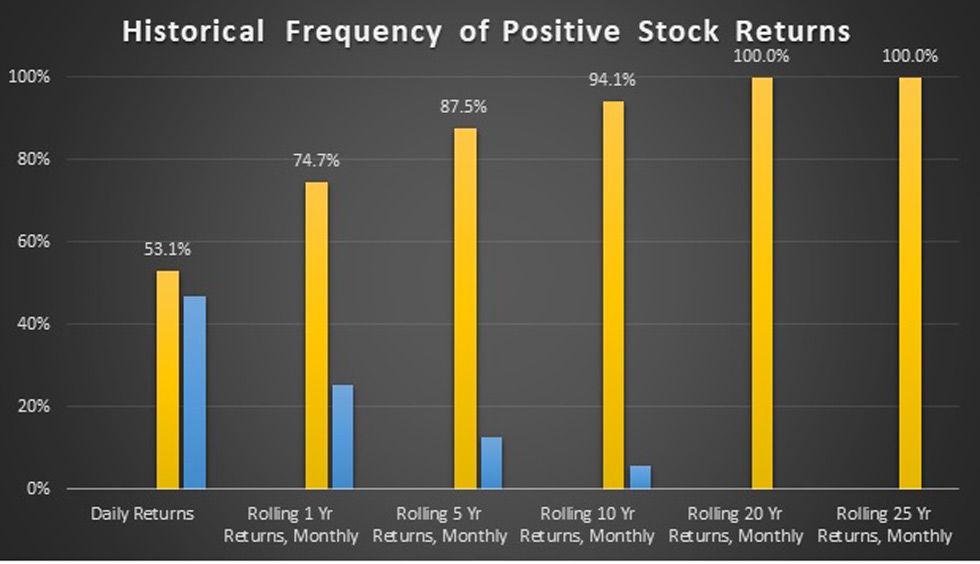3 Great Reasons Why You Should Start Saving Early
Once you see what you could gain by stuffing your piggy bank now (and the potential riches you’re giving up by waiting), you'll see why there really is no time like the present.


Profit and prosper with the best of Kiplinger's advice on investing, taxes, retirement, personal finance and much more. Delivered daily. Enter your email in the box and click Sign Me Up.
You are now subscribed
Your newsletter sign-up was successful
Want to add more newsletters?

Delivered daily
Kiplinger Today
Profit and prosper with the best of Kiplinger's advice on investing, taxes, retirement, personal finance and much more delivered daily. Smart money moves start here.

Sent five days a week
Kiplinger A Step Ahead
Get practical help to make better financial decisions in your everyday life, from spending to savings on top deals.

Delivered daily
Kiplinger Closing Bell
Get today's biggest financial and investing headlines delivered to your inbox every day the U.S. stock market is open.

Sent twice a week
Kiplinger Adviser Intel
Financial pros across the country share best practices and fresh tactics to preserve and grow your wealth.

Delivered weekly
Kiplinger Tax Tips
Trim your federal and state tax bills with practical tax-planning and tax-cutting strategies.

Sent twice a week
Kiplinger Retirement Tips
Your twice-a-week guide to planning and enjoying a financially secure and richly rewarding retirement

Sent bimonthly.
Kiplinger Adviser Angle
Insights for advisers, wealth managers and other financial professionals.

Sent twice a week
Kiplinger Investing Weekly
Your twice-a-week roundup of promising stocks, funds, companies and industries you should consider, ones you should avoid, and why.

Sent weekly for six weeks
Kiplinger Invest for Retirement
Your step-by-step six-part series on how to invest for retirement, from devising a successful strategy to exactly which investments to choose.
Our clients often ask “How much do I need to save this year to be on track for retirement?” Obviously, there are a lot of variables that go into answering that question: retirement spending, assumed rate of return, pensions and Social Security to name a few. But perhaps the most important variable is the one that’s priceless: time.
People with the most time on their side are those most likely to achieve their retirement goals. Those who save early end up way ahead of their procrastinating peers.
You may have heard the wise Chinese proverb that says "The best time to plant a tree was 20 years ago. The second-best time is now." The same is true for saving. While the best time to start saving may have been 20 years ago, don't fret, there are ample benefits to starting to save today.
From just $107.88 $24.99 for Kiplinger Personal Finance
Become a smarter, better informed investor. Subscribe from just $107.88 $24.99, plus get up to 4 Special Issues

Sign up for Kiplinger’s Free Newsletters
Profit and prosper with the best of expert advice on investing, taxes, retirement, personal finance and more - straight to your e-mail.
Profit and prosper with the best of expert advice - straight to your e-mail.
Let's look at a few of the most important reasons.
Time is Money
There are few forces as impressive and powerful as compound interest. The real secret to compound interest is less about the amount that is saved, and more about the amount of time it is invested. Let's compare saving $1,000 at age 40 versus age 30 with a hypothetical 5% compound annual return to age 65.

The 30-year-old saver ends up with over 60% more money simply because she saved 10 years earlier.
Instead of just investing $1,000 one time, what if you saved $1,000 per year from 40 to 65 versus starting at age 30?

In this example by starting 10 years earlier you have almost double the final amount at age 65!
The earlier you start the more magical compound interest is.
Opportunity Lost
What if you don't save for the first several years or decades of your career but save massive amounts of money later in retirement? Will that balance things out? Maybe, but there are some opportunities lost.
First, if you have an employer-sponsored retirement plan like a 401(k) that offers an employer match, those dollars are forever lost each year that you don't contribute. If you start saving later, you can't go back to your employer and ask that they give you the lost matching dollars from earlier in your career. Employer matches are free money: Never leave that on the table.
Another consideration is IRS maximum contribution amounts. All tax-advantaged retirement vehicles like 401(k)s, IRAs, etc. have maximum contribution limits each year. For example, in 2019 you can contribute $6,000 into a traditional IRA or a Roth IRA. If you don't make that contribution by the tax-filing deadline next year, that's a lost opportunity and no matter how much money you want to save in the future, you can't get that IRA contribution opportunity back. Yes, you can still save, but you'll have to choose less tax-efficient vehicles and that will impact your return and ending value.
We advise our clients to max out their retirement accounts every single year to take advantage of these tax-saving opportunities from Uncle Sam!
Market Trends
One final advantage I'll point out to saving and investing earlier rather than later is that the stock market presents a much better opportunity for long-term investors than it does for short-term investors. People who invest in the stock market with a short time horizon often get burned and have negative returns. So why then do we invest money for retirement in the stock market? Well, consider the following data.
Between 1928 and 2017, if you had invested in the market any given day, your chances of a positive return were 53.1%; about as good as flipping a coin. As you increase your investment period, your likelihood of a positive return significantly increases. Rolling one-year calendar returns had a 74.7% occurrence of positive returns, and rolling 10-year periods were positive 94.1% of the time! Once you increase the time period to 20 years, there were no negative return periods!

Source: Global Finance Data Inc. as of 12/31/2017. Based on historical S&P 500 returns over various periods. Daily return data begins on 01/31/1928, and based on price appreciation only.
Although nothing is ever guaranteed when it comes to investing, history shows that the longer you are invested, the greater your chance for favorable returns. I've heard it said that what truly matters in investing is not timing the market but time in the market. Get money invested early so your time horizon is long enough to ride out short-term volatility in pursuit of long-term gains. You can sum it all up like this:
- The longer your money is invested, the more compounding you experience.
- There are specific retirement savings opportunities offered each year that may be forfeited if not acted on.
- And the stock market should be viewed as a long game, not a quick turnaround.
Because of these reasons, you should start saving today. Even if you can't save as much as you need to right now, start with something. Get some money working for you and get time on your side. Don't let another year go by lamenting that you haven't started planting financial trees. Besides, today is the second-best time to start!
Profit and prosper with the best of Kiplinger's advice on investing, taxes, retirement, personal finance and much more. Delivered daily. Enter your email in the box and click Sign Me Up.

Josh Monroe is a CERTIFIED FINANCIAL PLANNER™ practitioner and a Chartered Financial Consultant designee who listens actively and plans thoughtfully to help clients achieve their goals. He joined the CI Brightworth team in 2019 as a Financial Planner. Before CI Brightworth, Josh spent eight years at a leading insurance and investment firm in a variety of roles, including compliance and supervision. Josh is passionate about financial planning and making complex concepts easy to understand.
-
 5 Vince Lombardi Quotes Retirees Should Live By
5 Vince Lombardi Quotes Retirees Should Live ByThe iconic football coach's philosophy can help retirees win at the game of life.
-
 The $200,000 Olympic 'Pension' is a Retirement Game-Changer for Team USA
The $200,000 Olympic 'Pension' is a Retirement Game-Changer for Team USAThe donation by financier Ross Stevens is meant to be a "retirement program" for Team USA Olympic and Paralympic athletes.
-
 10 Cheapest Places to Live in Colorado
10 Cheapest Places to Live in ColoradoProperty Tax Looking for a cozy cabin near the slopes? These Colorado counties combine reasonable house prices with the state's lowest property tax bills.
-
 Don't Bury Your Kids in Taxes: How to Position Your Investments to Help Create More Wealth for Them
Don't Bury Your Kids in Taxes: How to Position Your Investments to Help Create More Wealth for ThemTo minimize your heirs' tax burden, focus on aligning your investment account types and assets with your estate plan, and pay attention to the impact of RMDs.
-
 Are You 'Too Old' to Benefit From an Annuity?
Are You 'Too Old' to Benefit From an Annuity?Probably not, even if you're in your 70s or 80s, but it depends on your circumstances and the kind of annuity you're considering.
-
 In Your 50s and Seeing Retirement in the Distance? What You Do Now Can Make a Significant Impact
In Your 50s and Seeing Retirement in the Distance? What You Do Now Can Make a Significant ImpactThis is the perfect time to assess whether your retirement planning is on track and determine what steps you need to take if it's not.
-
 Your Retirement Isn't Set in Stone, But It Can Be a Work of Art
Your Retirement Isn't Set in Stone, But It Can Be a Work of ArtSetting and forgetting your retirement plan will make it hard to cope with life's challenges. Instead, consider redrawing and refining your plan as you go.
-
 The Bear Market Protocol: 3 Strategies to Consider in a Down Market
The Bear Market Protocol: 3 Strategies to Consider in a Down MarketThe Bear Market Protocol: 3 Strategies for a Down Market From buying the dip to strategic Roth conversions, there are several ways to use a bear market to your advantage — once you get over the fear factor.
-
 For the 2% Club, the Guardrails Approach and the 4% Rule Do Not Work: Here's What Works Instead
For the 2% Club, the Guardrails Approach and the 4% Rule Do Not Work: Here's What Works InsteadFor retirees with a pension, traditional withdrawal rules could be too restrictive. You need a tailored income plan that is much more flexible and realistic.
-
 Retiring Next Year? Now Is the Time to Start Designing What Your Retirement Will Look Like
Retiring Next Year? Now Is the Time to Start Designing What Your Retirement Will Look LikeThis is when you should be shifting your focus from growing your portfolio to designing an income and tax strategy that aligns your resources with your purpose.
-
 I'm a Financial Planner: This Layered Approach for Your Retirement Money Can Help Lower Your Stress
I'm a Financial Planner: This Layered Approach for Your Retirement Money Can Help Lower Your StressTo be confident about retirement, consider building a safety net by dividing assets into distinct layers and establishing a regular review process. Here's how.